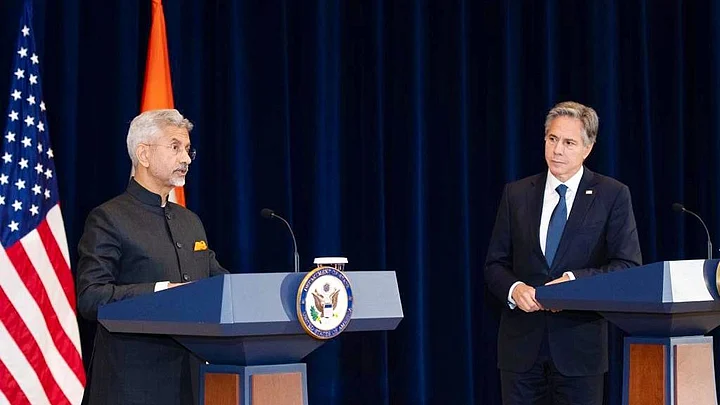A day after India’s External Affairs Minister S Jaishankar expressed concern over the United States decision to provide a $450-million sustenance package for Pakistan’s F-16 fleet, US Secretary of State Antony Blinken on Tuesday, 27 September, said it is the US’ obligation to help deal with the threat of terrorism.
While addressing a joint press conference with Jaishankar, Blinken said that the sustenance package wasn’t a new programme and Washington’s intentions were to bolster Pakistan’s capability to deal with “clear terrorist threats” from al-Qaeda and ISIS. “It’s in no one’s interest that those threats be able to go forward with impunity,” he said.
“There are clear terrorism threats that continue to emanate from Pakistan itself, as well as from neighbouring countries and whether it is TTP that may be targeting Pakistan, whether it’s ISIS or whether it’s al-Qaeda, I think the threats are clear, well known and we all have an interest in making sure that we have the means to deal with them. And that’s what this is about,” he said.
The sustenance package overturns the Trump administration’s decision to suspend military aid to Pakistan for providing a safe haven to the Afghan Taliban and the Haqqani network.
Bullish About Bilateral Relationship: Jaishankar
Addressing the joint press conference, Jaishankar on Tuesday said he is very bullish about the US-India bilateral relationship.
"The big change that I have seen in my four decades as a diplomat was actually in the transformation of India-US relations," he said.
"I mean, the fact was a Quad was something we tried about two decades – 15 years – ago. It didn't work, and it is working very well today and it's grown remarkably in the course of the last two years," he noted. Quad is the informal grouping of Australia, Japan, India and the United States.
Jaishankar also said that he flagged some visa-related challenges for Indians to Blinken in their meeting. The waiting period for Indians looking to secure a visitor visa, for example, has gone up to 800 days.
Blinken said the visa issues were largely due to the COVID-19 pandemic and asserted that the US was aiming to address those concerns.
Echoing Jaishankar, Blinken said no two countries have a greater ability and opportunity and responsibility to try to shape the future of this century than the US and India as the world's two largest democracies.
"What is very gratifying to me is the fact that in all of these meetings, in all of these conversations in this ongoing dialogue we have, we are thinking together and working together in ways that we haven't before," he said.
"That doesn't mean that we don't have differences. We do, and we will. But it also means that because of the depth and quality of the dialogue we have, we talk about everything and work closely together on how we can advance the agenda that we have in common, which – as you've heard, I think, from both of us – extends to virtually every issue that is confronting our own citizens and people around the world," the Secretary of State said.
(At The Quint, we question everything. Play an active role in shaping our journalism by becoming a member today.)
